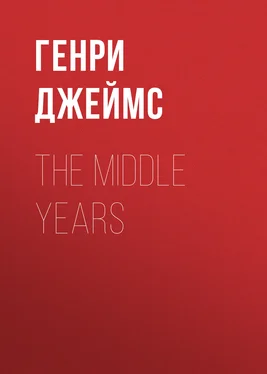Генри Джеймс - The Middle Years
Здесь есть возможность читать онлайн «Генри Джеймс - The Middle Years» — ознакомительный отрывок электронной книги совершенно бесплатно, а после прочтения отрывка купить полную версию. В некоторых случаях можно слушать аудио, скачать через торрент в формате fb2 и присутствует краткое содержание. Жанр: Биографии и Мемуары, foreign_antique, на английском языке. Описание произведения, (предисловие) а так же отзывы посетителей доступны на портале библиотеки ЛибКат.
- Название:The Middle Years
- Автор:
- Жанр:
- Год:неизвестен
- ISBN:нет данных
- Рейтинг книги:5 / 5. Голосов: 1
-
Избранное:Добавить в избранное
- Отзывы:
-
Ваша оценка:
- 100
- 1
- 2
- 3
- 4
- 5
The Middle Years: краткое содержание, описание и аннотация
Предлагаем к чтению аннотацию, описание, краткое содержание или предисловие (зависит от того, что написал сам автор книги «The Middle Years»). Если вы не нашли необходимую информацию о книге — напишите в комментариях, мы постараемся отыскать её.
The Middle Years — читать онлайн ознакомительный отрывок
Ниже представлен текст книги, разбитый по страницам. Система сохранения места последней прочитанной страницы, позволяет с удобством читать онлайн бесплатно книгу «The Middle Years», без необходимости каждый раз заново искать на чём Вы остановились. Поставьте закладку, и сможете в любой момент перейти на страницу, на которой закончили чтение.
Интервал:
Закладка:
To return at all across the years to the gates of the paradise of the first larger initiations is to be ever so tempted to pass them, to push in again and breathe the air of this, that and the other plot of rising ground particularly associated, for memory and gratitude, with the quickening process. The trouble is that with these sacred spots, to later appreciation, the garden of youth is apt inordinately to bristle, and that one's account of them has to shake them together fairly hard, making a coherent thing of them, to profit by the contribution of each. In speaking of my earliest renewal of the vision of Europe, if I may give so grand a name to a scarce more than merely enlarged and uplifted gape, I have, I confess, truly to jerk myself over the ground, to wrench myself with violence from memories and images, stages and phases and branching arms, that catch and hold me as I pass them by. Such a matter as my recovery of contact with London for a few weeks, the contact broken off some nine years before, lays so many plausible traps for me that discretion half warns me to stand off the ground and walk round it altogether. I stop my ears to the advice, however, under the pleading reminder that just those days began a business for me that was to go ever so much further than I then dreamed and planted a seed that was, by my own measure, singularly to sprout and flourish—the harvest of which, I almost permit myself to believe, has even yet not all been gathered. I foresee moreover how little I shall be able to resist, throughout these Notes, the force of persuasion expressed in the individual vivid image of the past wherever encountered, these images having always such terms of their own, such subtle secrets and insidious arts for keeping us in relation with them, for bribing us by the beauty, the authority, the wonder of their saved intensity. They have saved it, they seem to say to us, from such a welter of death and darkness and ruin that this alone makes a value and a light and a dignity for them, something indeed of an argument that our story, since we attempt to tell one, has lapses and gaps without them. Not to be denied also, over and above this, is the downright pleasure of the illusion yet again created, the apparent transfer from the past to the present of the particular combination of things that did at its hour ever so directly operate and that isn't after all then drained of virtue, wholly wasted and lost, for sensation, for participation in the act of life, in the attesting sights, sounds, smells, the illusion, as I say, of the recording senses.
What began, during the springtime of my actual reference, in a couple of dusky ground-floor rooms at number 7 Half-Moon Street, was simply an establishment all in a few days of a personal relation with London that was not of course measurable at the moment—I saw in my bedazzled state of comparative freedom too many other relations ahead, a fairly intoxicated vision of choice and range—but that none the less set going a more intimately inner consciousness, a wheel within the wheels, and led to my departing, the actual, the general incident closed, in possession of a return-ticket "good," as we say, for a longer interval than I could then dream about, and that the first really earnest fumble of after years brought surprisingly to light. I think it must have been the very proportions themselves of the invitation and the interest that kept down, under the immense impression, everything in the nature of calculation and presumption; dark, huge and prodigious the other party to our relation, London's and mine, as I called it, loomed and spread—much too mighty a Goliath for the present in any conceivable ambition even of a fast-growing David. My earlier apprehension, fed at the season as from a thousand outstretched silver spoons—for these all shone to me with that effect of the handsomest hospitality—piled up the monster to such a height that I could somehow only fear him as much as I admired and that his proportions in fact reached away quite beyond my expectation. He was always the great figure of London, and I was for no small time, as the years followed, to be kept at my awe-struck distance for taking him on that sort of trust: I had crept about his ankles, I had glanced adventurously up at his knees, and wasn't the moral for the most part the mere question of whether I should ever be big enough to so much as guess where he stopped?
Odd enough was it, I make out, that I was to feel no wonder of that kind or degree play in the coming time over such other social aspects, such superficially more colourable scenes as I paid, in repetition as frequent as possible, my respects and my compliments to: they might meet me with wreathed smiles and splendid promises and deep divinations of my own desire, a thousand graces and gages, in fine, that I couldn't pretend to have picked up within the circle, however experimentally widened, of which Half-Moon Street was the centre, and nothing therefore could have exceeded the splendour of these successive and multiplied assurances. What it none the less infinitely beguiles me to recognise to-day is that such exhibitions, for all their greater direct radiance, and still more for all their general implication of a store of meaning and mystery and beauty that they alone, from example to example, from prodigy to prodigy, had to open out, left me comparatively little crushed by the impression of their concerning me further than my own action perhaps could make good. It was as if I had seen that all there was for me of these great things I should sooner or later take; the amount would be immense, yet, as who should say, all on the same plane and the same connection, the æsthetic, the "artistic," the romantic in the looser sense, or in other words in the air of the passions of the intelligence. What other passions of a deeper strain, whether personal or racial, and thereby more superstitiously importunate, I must have felt involved in the question of an effective experience of English life I was doubtless then altogether unprepared to say; it probably came, however, I seem actually to make out, very much to this particular perception, exactly, that any penetration of the London scene would be experience after a fashion that an exercise of one's "mere intellectual curiosity" wherever else wouldn't begin to represent, glittering as the rewards to such curiosity amid alien peoples of genius might thoroughly appear. On the other hand it was of course going to be nothing less than a superlative help that one would have but to reach out straight and in the full measure of one's passion for these rewards, to find one's self carried all the way by one's active, one's contemplative concern with them—this delightful affair, fraught with increase of light, of joy and wonder, of possibilities of adventure for the mind, in fine, inevitably exhausting the relation.
Читать дальшеИнтервал:
Закладка:
Похожие книги на «The Middle Years»
Представляем Вашему вниманию похожие книги на «The Middle Years» списком для выбора. Мы отобрали схожую по названию и смыслу литературу в надежде предоставить читателям больше вариантов отыскать новые, интересные, ещё непрочитанные произведения.
Обсуждение, отзывы о книге «The Middle Years» и просто собственные мнения читателей. Оставьте ваши комментарии, напишите, что Вы думаете о произведении, его смысле или главных героях. Укажите что конкретно понравилось, а что нет, и почему Вы так считаете.












